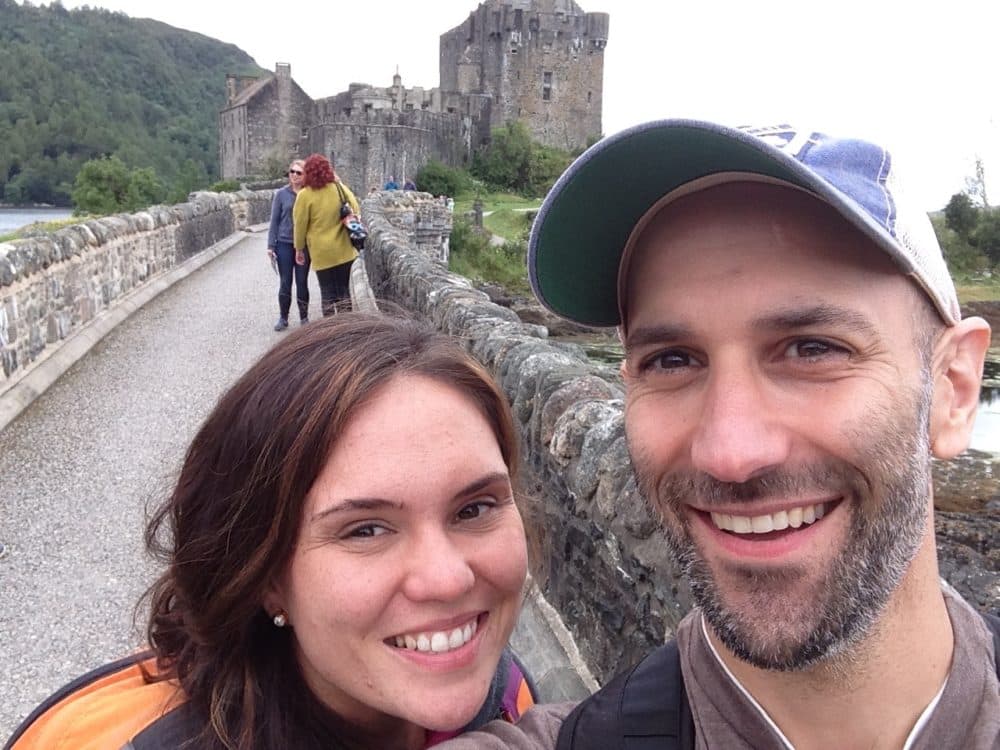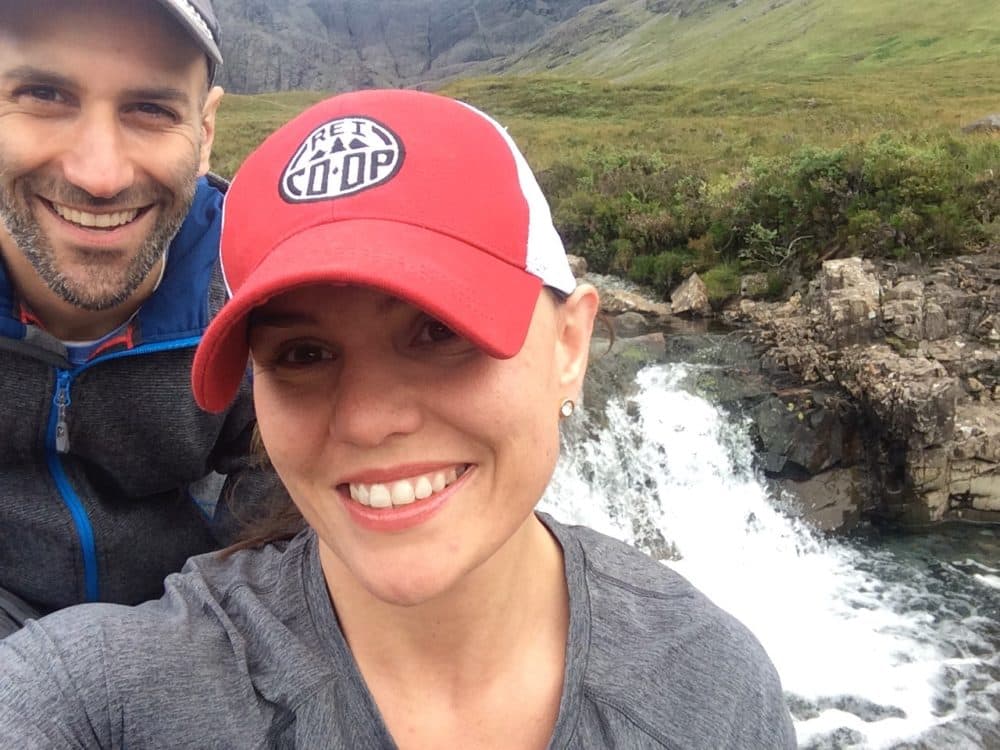Advertisement
Commentary
I Lost Laura 4 Years Ago. The Law Passed In Her Name Will Save Lives

As armies go, mine might not have sounded like much: a fierce force of retired middle-school teachers, hardware helpers at the Saugus Lowe's, members of an over-40 men's baseball league, more than 100 people with asthma, a homeschooling cooperative from Western Mass., and yes, even a Duck Boat conductor or two.
But were it not for all their help, my mission last week to create something positive out of a terrible tragedy might have failed. And if it had failed, I think in a small way, democracy would have failed, too.
For nearly two years, I've been pushing for the passage of “Laura's Law,” named after my late wife, Laura Beth Levis, who died from an asthma attack just steps from an emergency-room door. Of all the mistakes that contributed to Laura's death, perhaps most glaring was how the hospital lacked a simple, emergency-room sign above any door. Confused by this, Laura tried the wrong door, which was locked. Her attack overcame her before she could make it to the right door.
Laura's Law would make every emergency-room entrance in Massachusetts easy to find and get inside by establishing first-ever standards for signage, lighting and the security monitoring of doors. It was a straight-forward piece of legislation that was bound to save someone's life, but unfortunately, that wasn't enough.

The legislative process is frustratingly slow even without a pandemic; with one, hundreds of smaller bills like Laura's Law stood little chance of being voted on before Jan. 5, the official end of the legislative session. With just days left before the deadline, there was a 50/50 chance the bill would die in committee, and I began to fear that all our work, and Laura's awful death, would not change a thing.
The tail end of every legislative session is routinely insane — it's as though lawmakers address six months' worth of work in the final 48 hours. My bill sponsors, Rep. Christine Barber and Sen. Pat Jehlen of Somerville, told me that if we could somehow keep Laura's Law from falling to the bottom of the pile, it might be heard before the buzzer sounded. We had to make the bill a squeaky wheel, so I began asking everyone I knew to write, email or phone the State House.
Little did I know that my distress call would be heard across Massachusetts.
Advertisement
Half the guys in my over-the-hill men's baseball league made personal pleas, as did members of a South Shore CrossFit gym, a group of Central Mass. nurses, a Slack political action group from Turner's Falls, some of Laura's Harvard University co-workers and at least two dozen friends and friends of friends who called their local state representatives imploring them to tell State House leadership not to forget this bill.
It was a straight-forward piece of legislation that was bound to save someone's life, but unfortunately, that wasn't enough.
High school classmates from Lynnfield and college buddies from Tufts University I hadn't seen in 25 years made phone calls and posted on their Facebook pages and Twitter feeds to spread the word. My mother, a retired North Shore middle-school teacher, reached out to a dozen former co-workers who sprang to action. A distant cousin got 20 co-workers at the Saugus Lowe's to send emails — and even a few customers she met.
Massachusetts's asthma community, spurred on by a plea from the Asthma and Allergy Foundation of America, responded with another 150 emails, followed by nearly 200 more from members of the Boston Center for Independent Living, the city's loudest voice for the disabled community, which could benefit from improved access. Somerville and Cambridge city councilors joined the chorus, as did Cambridge's mayor and its state representative, Marjorie Decker, who'd been a caring ally since the beginning. Laura's family, though they don't live in Massachusetts, did so, too.
By nightfall on Jan. 5, our army — Laura's army — had battered House Speaker Ron Mariano and Ways and Means Chair Aaron Michlewitz with more than 1,700 emails and nearly 500 phone calls – most of those coming in the final two days. “I'm a bit overwhelmed,” Michlewitz's secretary told me when I called to add my name to the list of supporters. “And I'm praying for you.”
On that final night, I sat at home watching online as one bill after another came and went. At 8:47 p.m., I looked at my phone and saw a text from my bill sponsor, Rep. Barber, who'd been doing all she could as well behind the scenes. “We're about to vote Laura's Law out of House Ways and Means.”
At 11:28 p.m., with dozens of friends and family members watching from their homes as well, Senate Bill 2931, “An Act Ensuring Safe Patient Access to Emergency Care,” was voted upon by the House — and passed unanimously.
In the wee hours of the morning, the Senate, which had approved its version of the bill in October, officially sent it to Governor Charlie Baker's office. He signs it Friday.
It was the victory I'd fought so hard for, but, of course, it was bittersweet. Laura is gone. After some tears, I just felt relieved that the journey was over.
Others, however, were overjoyed.
“Advocacy works!” emailed a friend of Laura's from Emerson College. “Amazing to see what happens when people come together for a cause.”
“With the events in D.C. unfolding this afternoon, I'm not sure if hope is enough to set things right in our broken country,” wrote a friend on Facebook last Wednesday. “But, I'm not giving up that easily... Peter didn't give up.”
“As the world crumbles around us,” the best man at our wedding texted me, “How's it feel to have done something good and righteous?”
I wrote “Losing Laura” two years ago for the Boston Globe so that no one else would ever die as my wife did. There wasn't a chance I would give up.
But it took more than love and determination to pass Laura's Law. It took a lot of people doing the right thing for the right reason.
It took ... democracy.
“I was telling my son Henry this morning about Laura's Law and he said, 'We are just learning about how to pass a law in history class,'” said an old high school friend. “He went on to tell me all the steps that it takes and I said that is exactly what Peter has been going through. He paused and smiled and said, ''That means the system works. That it can work.'”
Yes, it can, Henry. It can.
Follow Cognoscenti on Facebook and Twitter.
The audio on this post is interview with the author of this commentary, Peter DeMarco, and Jack Lepiarz, a host of WBUR's All Things Considered.
This article was originally published on January 14, 2021.
This segment aired on January 15, 2021.
